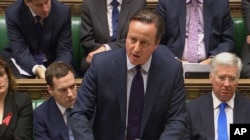British fighter jets have carried out the first airstrikes in Syria targeting Islamic State – also known as IS or Daesh - following a vote in parliament backing increased military action. Several countries — including the U.S.-led coalition and Russia, are already carrying out bombing raids against the terror group.
Washington praised Britain’s increased involvement in the air campaign.
Just hours after military action was approved, four British Tornado jets took off from their base in Cyprus to attack Islamic State targets in Syria. The first bombs were dropped on the Omar oil refineries in the east, that it’s believed were used to fund the terror group.
Lawmakers debate airstrikes
Throughout Wednesday British lawmakers had held an impassioned 10-hour debate on extending the airstrikes into Syria. Prime Minister David Cameron sought to justify the action in the wake of the terror attacks in Paris.
“We should answer the call from our allies. The action we propose is legal, it is necessary and it is the right thing to do to keep our country safe,” he said.
Leader of the opposition Labor party Jeremy Corbyn appealed for more time to seek a peaceful end to Syria’s civil war. "Do we send in bombers, not totally aware of what all the consequences are going to be? Or do we pause," he questioned. "Not send them in and instead put all of our efforts into bringing about a peaceful, humanitarian and just political settlement?"
Labor’s shadow foreign secretary Hilary Benn drew applause with his speech contradicting his own party leader – and spoke in favor of military action.
“Now I share the concerns that have been expressed this evening about potential civilian casualties. However, unlike Daesh, none of us today act with the intent to harm civilians. Rather, we act to protect civilians from Daesh who target innocent people," he said.
Lawmakers voted 397 to 223 in favor of military action.
Divisive issue
The issue has divided both parliament and the British public, said Ranj Alaaldin of the London School of Economics.
“There are two sides to the current debate. One is that inaction has had its consequences and therefore doing nothing may no longer simply be acceptable or feasible. The other issue is whether military action will make a difference. And I think that’s where it gets contentious,” Alaaldin stated.
Demonstrators opposed to the air strikes held protests in several cities.
Britain has sent eight further jets to its base in Cyprus as the bombing campaign intensifies.






